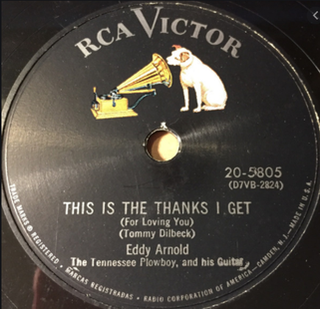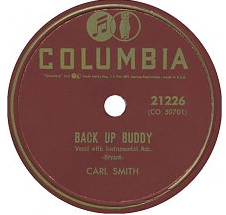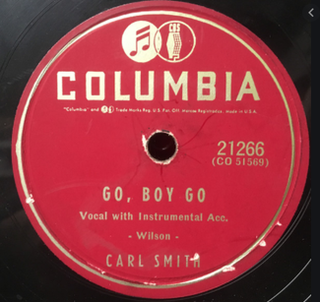"This Ole House" is an American popular song written by Stuart Hamblen, and published in 1954. Rosemary Clooney's version reached the top of the popular music charts in both the US and the UK in 1954. The song again topped the UK chart in 1981 in a recording by Shakin' Stevens.

"Mr. Sandman" is a popular song written by Pat Ballard and published in 1954. It was first recorded in May of that year by Vaughn Monroe & His Orchestra and later that year by The Chordettes and the Four Aces. The song's lyrics convey a request to "Mr. Sandman" to "bring me a dream" – the traditional association of the folkloric figure. The pronoun used to refer to the desired dream is often changed depending on the sex of the singer or group performing the song, as the original sheet music publication, which includes male and female versions of the lyrics, intended.
"Goodnite, Sweetheart, Goodnite" is a popular song that was a hit during the mid-1950s. It was written by Calvin Carter and James "Pookie" Hudson in 1951, and was first recorded by The Spaniels in 1953. It has also been released by some artists as "Goodnight, Well It's Time to Go".

"Oh Baby Mine (I Get So Lonely)" is a popular song. It was written by Pat Ballard and was published in 1953.

Johnnie & Jack were an American country music duo, composed of Johnnie Wright (1914–2011) and Jack Anglin (1916–1963). The duo became members of the Grand Ole Opry in the 1940s. Between 1951 and 1962, the duo released several singles on the RCA Victor Records label, including their version of "Goodnite, Sweetheart, Goodnite" which peaked at No. 4 on the Best Seller charts, and the No. 1 "(Oh Baby Mine) I Get So Lonely".
"I Love You Because" is a song written and recorded by country music singer and songwriter Leon Payne in 1949. The song has been covered by several artists throughout the years, including hit cover versions by Al Martino in 1963 and Jim Reeves in 1964.

Queen of Honky Tonk Street is an album recorded by Kitty Wells and released in 1967 on the Decca label in the United States and on the Calendar Records label (SR66-9640) in Australia.

Showcase is an album recorded by Kitty Wells and released in 1968 on the Decca label. In the United Kingdom, it was released by MCA Records with the title My Big Truck Drivin' Man. The album's title track, "My Big Truck Drivin' Man", was Wells' final top 40 hit, peaking at No. 35 on the Billboard country chart.
Billboard Top Country & Western Records of 1954 is made up of two year-end charts compiled by Billboard magazine ranking the year's top country and western records based on record sales and juke box plays.

"This Is the Thanks I Get (For Loving You)" is a song by Eddy Arnold. It was released in 1954 on the RCA Victor label (catalog no. 20-5805). It was written by Tommy Dilbeck. In August 1954, it peaked at No. 3 on the Billboard country and western chart. It was also ranked as the No. 12 record on Billboard's 1954 year-end country and western retail chart.

"Back Up Buddy" is a song written by Boudleaux Bryant, sung by Carl Smith, and released on the Columbia label. In May 1954, it peaked at No. 2 on the Billboard country and western chart. It was also ranked No. 17 on Billboard's 1954 year-end country and western retail chart.

"Wake Up Irene" is a parody song written by Johnny Hathcock and Weldon Allard, performed by Hank Thompson and His Brazos Valley Boys, and released in 1954 on the Capitol label.

"Go, Boy Go" is a song written by Floyd Wilson, performed by Carl Smith, and released on the Columbia label. In August 1954, it peaked at No. 4 on the Billboard country and western chart. It was also ranked No. 29 on Billboard's 1954 year-end country and western retail chart.
"Hep Cat Baby" is a country music song written by Cy Coben, sung by Eddy Arnold, and released in 1947 on the RCA Victor label. In August 1954, it reached No. 7 on the Billboard folk juke box chart. It was also ranked as the No. 25 record on the Billboard 1954 year-end folk juke box chart.

"I Love You" is a song written by B. Grimes, performed by Ginny Wright and Jim Reeves, and released on the Fabor label. In January 1954, it peaked at No. 3 on the Billboard country and western juke box chart and spent a total of 22 weeks on the charts. It was also ranked No. 27 on Billboard's 1954 year-end country and western retail sales chart.










